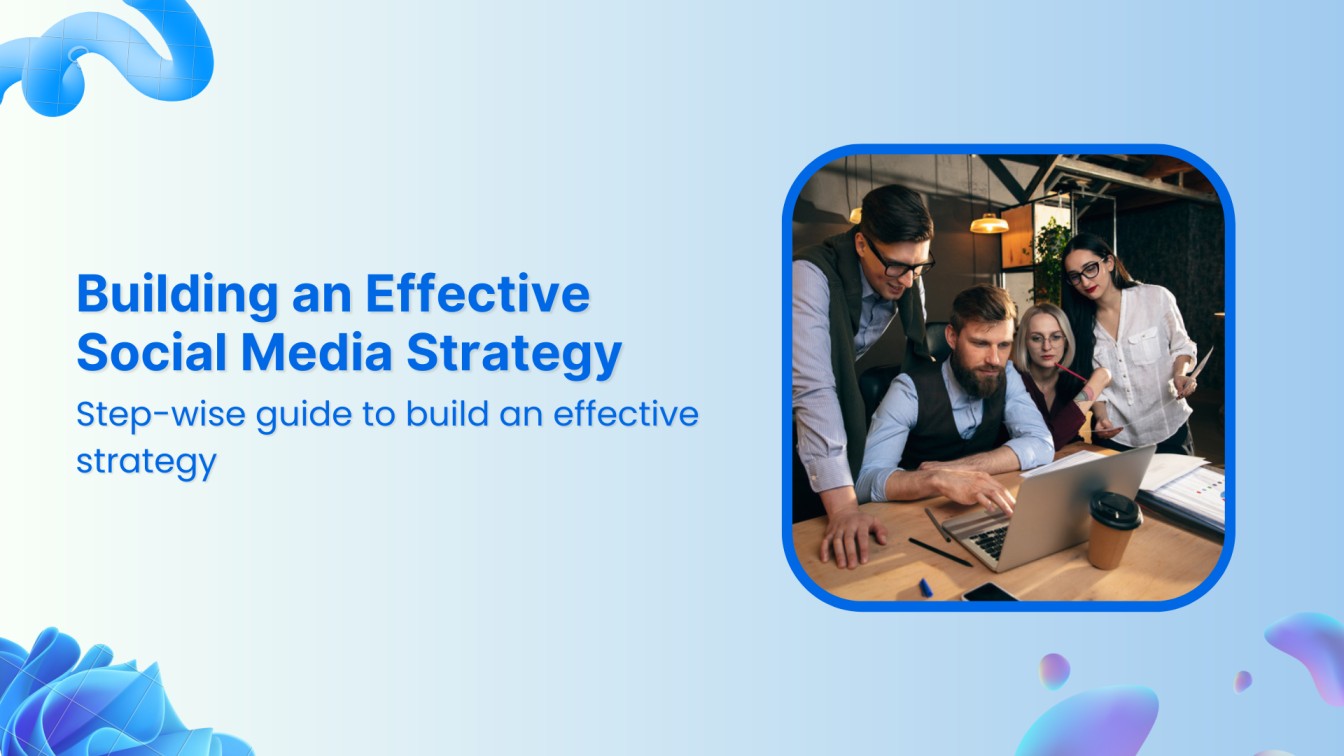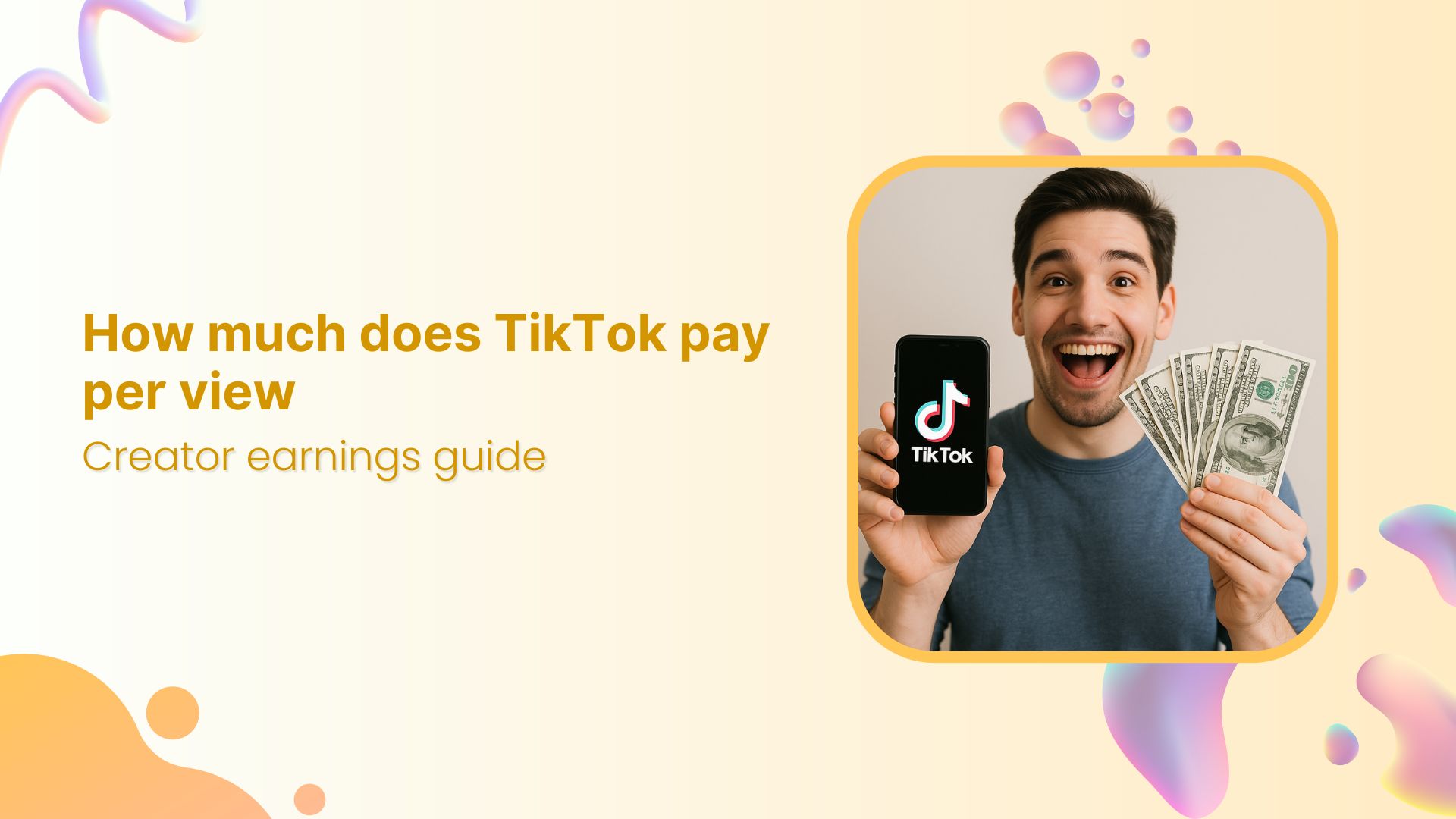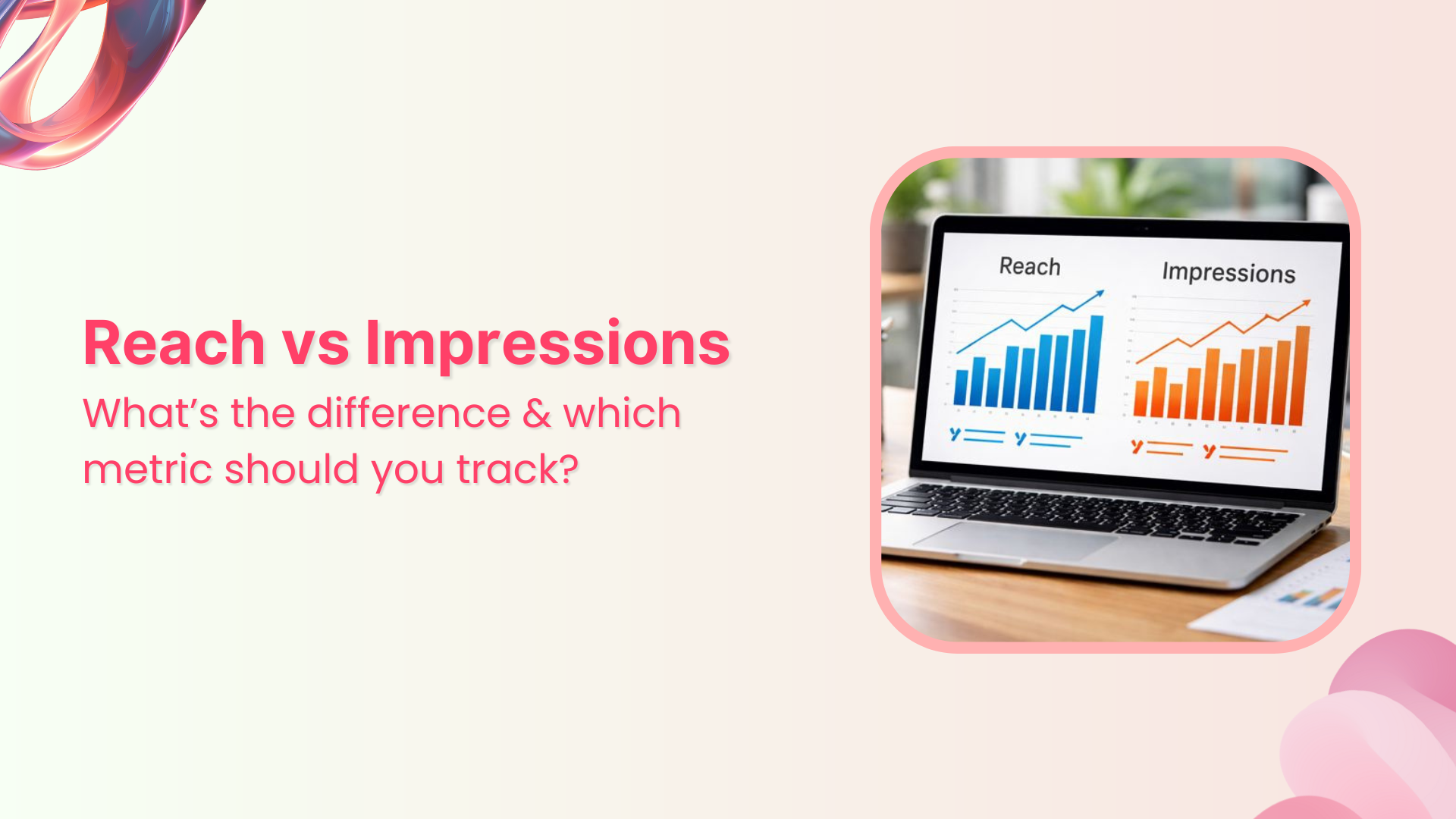Bulk-generate & schedule posts in seconds with Smart Scheduling. Try now!
How Brands Boost X (formally Twitter) Engagement With Humor
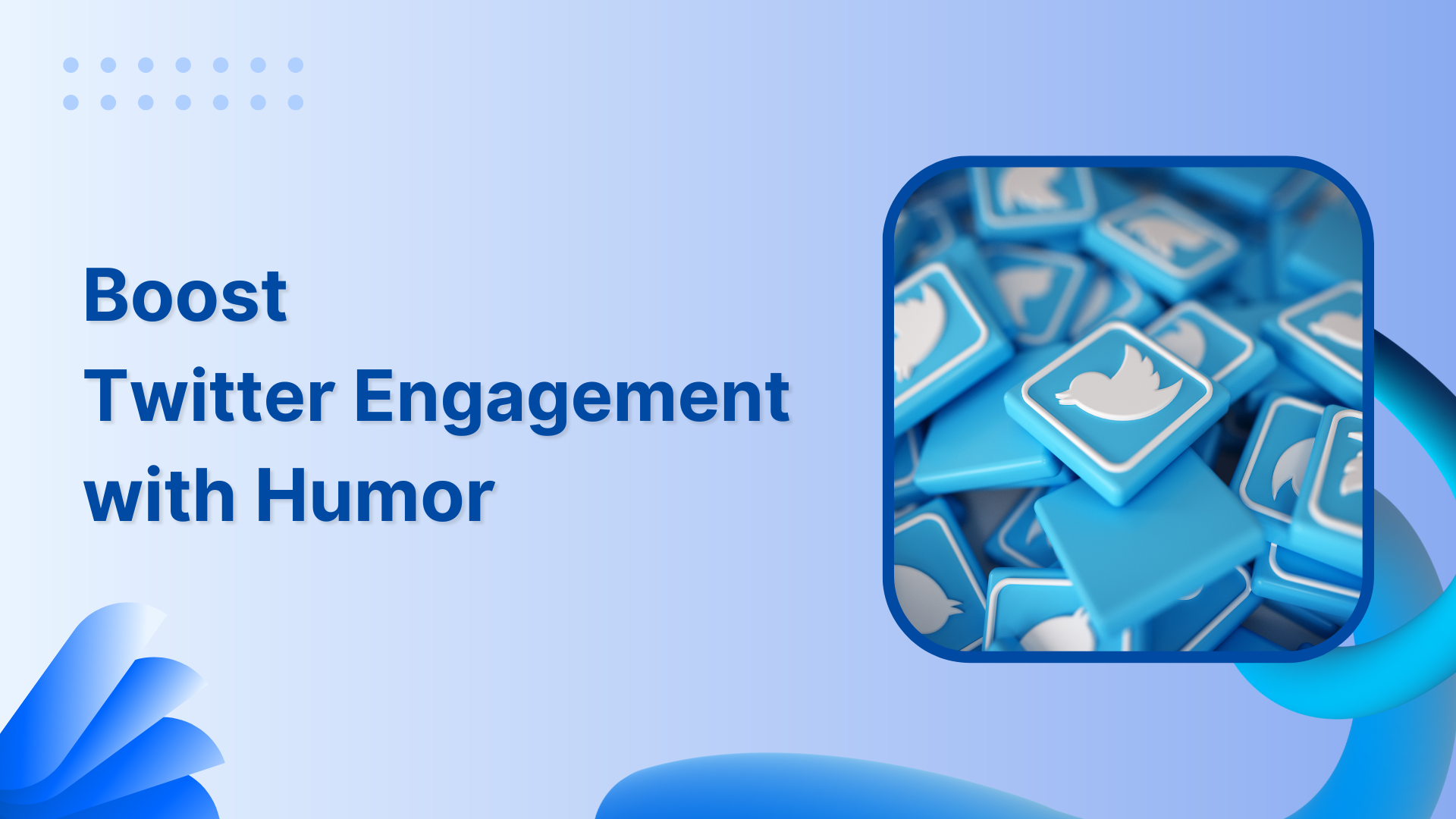
Know the one thing that makes Innocent Drink’s Twitter marketing such a winner? It’s their humorous marketing approach.
One look at their Twitter profile and you’ll see their banner image, bio, and tweets reflect their light-hearted marketing.
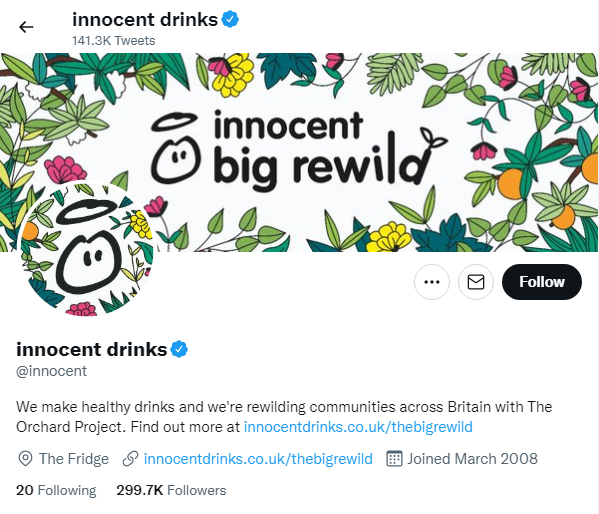
Most of all, the brand is funny in their comments too – no wonder their Twitter engagement is good.
Want to grow your Twitter with humor as Innocent Drinks has? You can always plan a humor-based Twitter marketing strategy like them. Or, you can throw an occasional joke to include humor as an aspect of your brand voice and strategy on the network.
Whatever approach you think suits your brand personality the best, this comprehensive guide on how to use humor to grow your Twitter is here to help.
We’ll talk about:
- The 5-step strategy for using humor to grow your engagement
- How brand use humor to grow their engagement on Twitter
- Funny things to tweet including tips to execute humor the correct way
- We’ve also got a case study of a brand growing its engagement with humor.
Let’s dive right into it:
First Things First: Let’s Start With Defining Humor
Before we dive in any further, we must get on the same page regarding what exactly is humor.
Wikipedia defines humor as: “the tendency of experiences to provoke laughter and provide amusement.”
The Encyclopedia Britannica has a tad bit of a technical take on the definition: “communication in which the stimulus produces amusement.”
Whatever the definition, it appears humor is the ability to be funny or comic. It doesn’t have to necessarily elicit laughs or giggles around the cloud. Instead, what you say could simply be a light joke that brings a wide smile to the faces of your readers.
In Twitter marketing, this would mean a joke can be anything packaged as funny Twitter memes, puns, analogies, or witty statements that cash in on trending Twitter hashtags.
How Do You Define Twitter Engagement?
Twitter engagement refers to all the ways people interact with your brand. It may include but not be limited to:
- Likes
- Retweets
- Replies
- Mentions (tagged or not), Followers,
- Embedded media and links
Put simply, the idea is to make your audience smile while never being offensive to them.
So how can you be humorous on Twitter and why should you be? Let’s talk about that next.
Why Should You Use Humor to Improve Twitter Engagement?
Let me make this clear: you don’t have to be humorous all the time if that’s not your brand personality.
Several brands on Twitter throw an occasional joke or jump on a trending funny Twitter meme wagon.
Case in point: SEMrush. They have a friendly brand voice and they aren’t afraid of cracking a joke or two sometimes. Mostly this joke comes in the form of a Twitter meme or an SEO joke based on trending hashtags.
So how does humor help them and how can it help you? Here’s how:
It’s a good way to stand out from the crowd. About 350,000 tweets are published every minute and unless you don’t have a strategy to get your audience’s attention and engage them, nobody will see you. A humor-led strategy is a good way to rise above the noise.
Good humor is a surefire way to grow your Twitter engagement. As you’ll see in the examples we share below, a friendly joke even if it’s self-directed or directed towards competition always gets a good reaction from the audience.
Funny jokes humanize your brand. Your audience loves nothing more than seeing your brand’s human side. Jokes help you show that side.
A good laugh wins hearts. There’s too much negativity out there. People are also cognitively overloaded, which makes it even more challenging to get your audience’s attention. However, good humor can help you not only engage your audience but is also something that can help them remember you.
Heads-up:
The key to Twitter marketing with humor is friendly, no-offense humor. If you are not careful along these lines, humor can backfire.
Read-Up: How does Twitter Algorithm Work in 2022? 15 Hacks to Beat It
The 5 Steps to Creating a Humor-Based Twitter Marketing Strategy
Now, let’s get to work on using humor for Twitter engagement:
Step 1: Research Your Audience
Any good strategy kicks off with audience research. Without it, you’re likely going to create a Twitter marketing strategy based on personal preferences – not your audience’s preferences.
Keep your aim simple: Find out what your audience likes. To this end, you can try a couple of things:
- Use an audience research tool such as Sparktoro
Sparktoro digs out what your audience frequently talks about, the social accounts they follow, the hashtags they use, and so on. Analyzing this information will help you get a taste of their preferences.
- Use Google Analytics for an overview of your audience’s interests
Head to Demographics for an overview of your audience’s location and gender. Then click on Interests and Affinity Categories to find out your audience’s topical interests.
- Talk to your followers on Twitter
Every company has loyal followers. If you’re only starting out, you can look up people who you think are your target audience. Reach out to them and offer an incentive to chat with you for 15 minutes. Nothing helps you learn about your audience more than your audience itself.
With all the data and interviews at hand, you’ll be able to tell your:
- Audience’s interests
- The language they use
- The references they’d understand
All this will help you create content (read: crack jokes) that is relevant to them.
Step 2: Develop a Brand Voice With Reference Examples
If you don’t already have brand voice guidelines, get to work.
These are essential for maintaining consistency in your business voice throughout the marketing channels you use and each channel itself.
Now you’d argue you know your voice well enough that you can maintain it consistently. However, you’ll likely fall into these two situations either today or later on.
- Someone else on the team tweets in your absence.
- You’ve decided to leave and someone else is taking over.
In either case, you can save time and maintain consistency in your voice simply by documenting your brand voice.
Remember: your entire voice doesn’t need to be funny. You could be informal or friendly formal or just a bit snarky. Whatever the case may be, note down examples of how it’s your brand should berous on Twitter.
Pro tip:
Refer to your brand voice guidelines as you retweet and reply to comments. This will help you develop an authentic brand voice that impresses your customers.
Step 3: Do Some Competitor Research
The aim here isn’t to copy. In fact, it could be your brand voice differentiating you from your competitors.
So here’s the game plan: study your competitors’ Twitter profiles and try to understand the key components of their Twitter marketing.
This should include an analysis of whether there is humor on Twitter. And, if they are: how so? Ask yourself:
- What jokes do they crack?
- What’s their tone as they crack these jokes?
- How are they engaging with their audience with humor?
Once you’ve your data down, work out:
- How do you plan to be different from your competitors?
- What are things you can do better than them?
Step 4: Create a Plan & Start Creating Content
With the groundwork done, create a plan for Twitter marketing outlining the core topics of your tweets, the voice, and tone you’ll use, who will keep an eye on the trending hashtags, and, so on.
Also, essential here is creating a plan for Twitter engagement and tracking Twitter analytics. Decide on how you’d engage your followers. Will you ask them questions? Retweet their content? Reply back to their comments. Host interesting polls?
At the same time, work out which metrics you’d be tracking to evaluate results. This depends on your goals from Twitter.
If you’re looking to grow brand awareness, for example, you’ll want to look at how your impressions and reach are growing. If you’re planning to drive engagement, look at each tweet’s engagement rate, and the average comments, likes, and retweets it gets.
When done, start writing your tweets. Having your Twitter content ready in advance leaves you with time to engage with your audience. It also saves you days when those creative gears won’t spin.
Want a pro tip for writing winning tweets? Rewrite your tweets. This helps you shorten your tweet – helping you say it more directly, which is something that Twitterratis appreciate a lot.
One last thing: be consistent. Tweet daily. If you find that’s a lot of manual work, use ContentStudio to schedule your tweets.
Simply log into ContentStudio and select Social Media Post in Composer mode. Now, pick Schedule from the four options available to you:
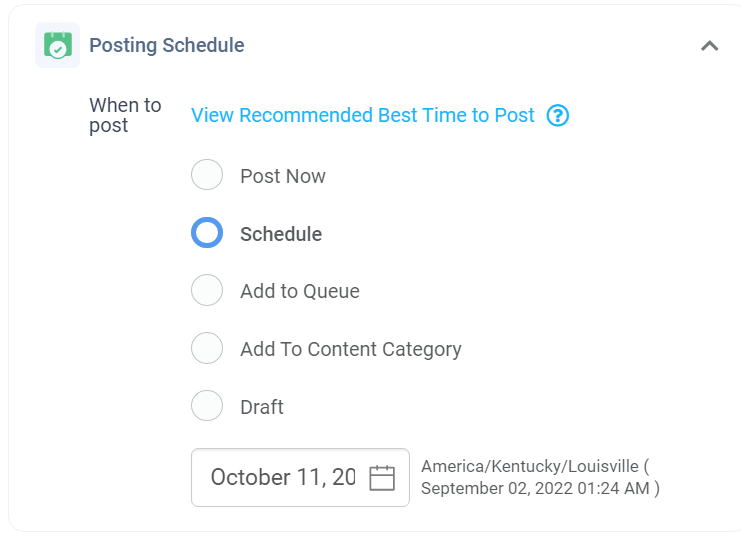
Now, compose your tweet here and schedule it. Then, repeat to add tweets to a queue.
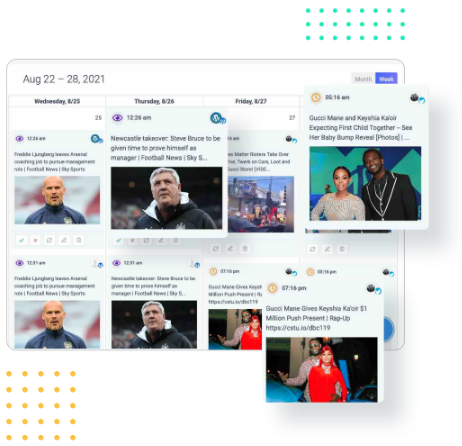
Social Media Calendar for Digital Agencies
Organize all your social posts and visualize your client’s social media content plan with an interactive Content Calendar
14 days free trial - no credit card requiredStep 5: Evaluate Twitter Engagement Results
As a social media manager or a one-person team wearing the social media management hat, you’ll want to study the performance of your Twitter strategy for a defined time.
But if we were to talk about evaluating humor for Twitter marketing alone, then you’ll want to look at each funny tweet’s performance.
This should be simple. Go to Twitter analytics on your profile page and locate the tweet you want stats on. Now look at its impressions and the engagement it drove.

Repeat the same for other funny Twitter memes you’ve made or jokes you’ve tweeted. Then, compare data to find out the jokes that garner the most engagement and reach.
This way, you can identify the jokes you want to double-double down for better, more refined and more audience-resonating humor on Twitter.

Analyze, Understand, and Improve Your Social Strategy
Stack your key social metrics against those of your competitors and make targeted steps towards social media success.
14 days free trial - no credit card requiredFunny Things to Post on Twitter
Now for some ideas for humorous tweets, you can add to your strategy:
1. Poke Fun at Other Brands
Wendy’s, for example, is widely known for the jokes they crack about their competitor, McDonald’s. Here’s an example;
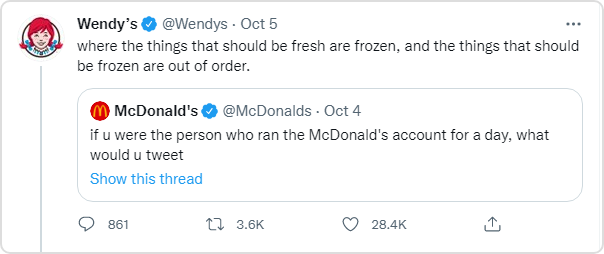
Note that this isn’t a fresh tweet but a retweet. You can replicate the approach used by Wendy’s Twitter marketing team while maintaining your brand voice.
2. Funny Twitter Memes
Memes on Twitter are a blend of plain text tweets and funny images that the users borrow from other networks. The Weekend Superbowl meme that went viral earlier in 2021 is an example.
This evergreen Drake meme is another example. Note that this example tweet is highly targeted to its audience: writers.
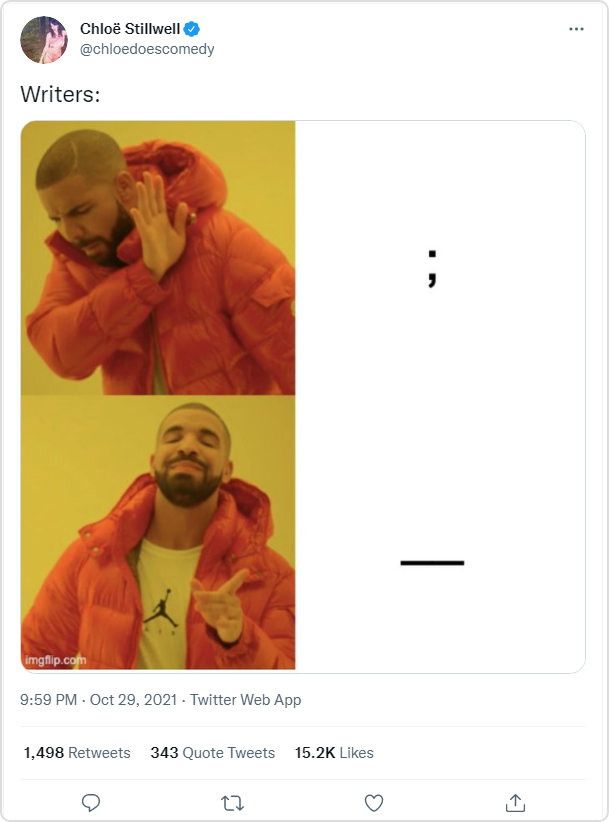
As for text-based memes, two prominent examples are the ‘red flag’ meme and the ‘did it hurt’ meme. Here’s an example:

3. Funny Images & GIFs
You can always make this product-led which helps you highlight your brand or its unique value proposition.
Take Bugles, for example. They tweeted this funny image with a caption that hints at their value prop (the cone-shaped crisps fit on your fingertips like caps):
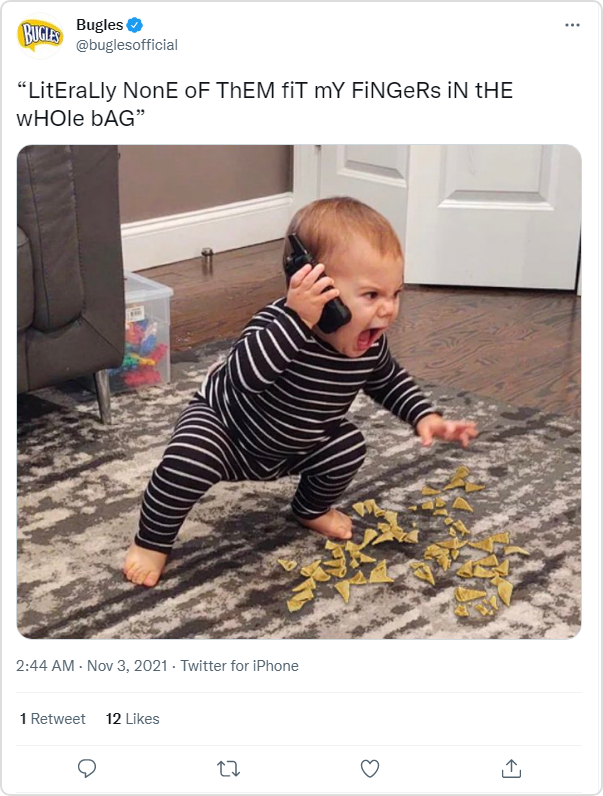
4. Create Content Around Funny Trends
Brands on Twitter also leverage funny trends and so can you. Simply keep an eye on your audience’s interest and see if you can crack a relevant joke when something starts trending.
It’s also important here that you don’t simply joke about what matters to your audience, but also something that aligns with your brand values.
Have some active followers or target customers? Add them to a Twitter list and keep an eye on the list to recognize any Twitter trends before it’s too late to tweet about them.
Here’s an example of SEMrush tapping into the Netflix show, “You”, that trended in October.


Discover Relevant, Trending And Engaging Content
Monitor content by keywords, topics or sources of your interest. Curate content that drives engagement on all of your channels.
14 days free trial - no credit card requiredRelated Read: What Is The Best Time To Post On Twitter in 2022
How To Be Humorous on Twitter: 9 tips
Let’s now dive into some tips to add humor to your Twitter marketing the right way:
1. Talk To Them, Not At Them
This is the golden rule for success in growing your Twitter engagement using humor. The reason? Talking at people is almost always offensive, which repels them and it backfires. Unless you’re a pro at this kind of humor, it’s best to never make fun of your followers.
2. Talk with a Conversational Approach
This is in line with the tip above. You don’t want to be demeaning or offensive. Instead, take a talk-like-you-are-talking-to-a-friend approach.
HAPPY #INTERNATIONALCOFFEEDAY!!! THANK GOODNESS FOR COFFEE!!! CAN YOU IMAGINE LIFE WITHOUT?! HAHAHAHAHAHA!!! THAT WOULD BE AWFUL, RIGHT? RIGHT?! MAN, I LOVE COFFEE SO MUCH!!! HAVE YOU EVER HAD OURS?! SOOOOO GOOD!!! I DRINK IT ALL DAY LONG! I’M ON MY LIKE FIFTH CUP AND
— Denny’s (@DennysDiner) October 1, 2021
3. Leverage Analogies to be Funny
Twitter users love good analogies. All the better if you can make them funny.
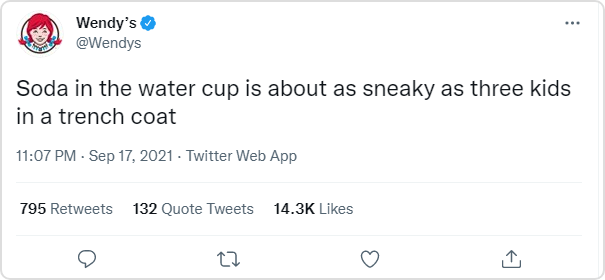
4. Create Amusing GIFs or Images
You can also be humorous with the images you use by customizing them to make a joke about your brand. See how Wendy’s does that in this tweet:
Did somebody say FREE Sausage or Bacon, Egg & Swiss Croissant? Yep, it was us. ❤️ this Tweet and we’ll remind you when it’s gone time on Friday 8/13 and Saturday 8/14. pic.twitter.com/pzsEgNdykw
— Wendy’s (@Wendys) August 6, 2021
Also worth noting here is the fact that not every tweet has to include a CTA or link to your site/offer. Your aim should be to offer value and engage your audience with content that resonates with them. So maintain a balance.
5. Capitalize On Trends
This one’s a super simple way to up your Twitter engagement. Simply make sure the trend is important to or resonates with your audience and then come up with something creative.
Netflix, for example, has taken a creative approach to market their show with this fun tweet:
The Notebook walked so @YouNetflix could run pic.twitter.com/QaZbEfG5QM
— Netflix (@netflix) November 2, 2021
6. Make Fun of Situations – Not People
If you’re still confused about good humor and what’s offensive, this is a super helpful tip. Here’s an example to explain how you can make fun of situations:
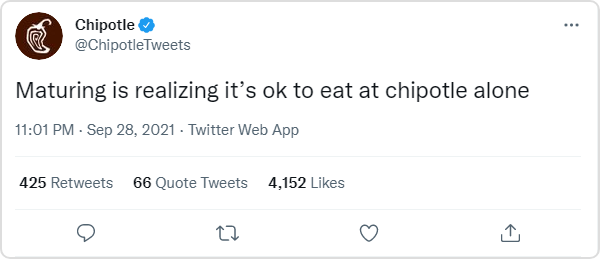
7. Talk Like a Human
This comes straight from the horse’s mouth as Twitter recommends you show your human side, not a robotic one.
With each tweet you make, run it through the following filter questions that Twitter shares:
- “Do they read as if they come from your brand or a robot?
- Are they random and disjointed?
- Is there a central, human voice?
- Is it apparent what your brand is all about?”
If you find your tweet isn’t following any one of these pointers, rewrite it until it does.
https://twitter.com/Twitter/status/1565318587736285184?s=20&t=780h5TQpZuL9D90GfcKCyA
8. Have Fun With Your Messaging
Another useful tip is to showcase your brand voice and have fun even as you make announcements. Uber’s announcement in light of social distancing requirements is light-hearted, for example:
To keep a safe distance between drivers and riders, the front seat is off-limits. It’s part of our Door-to-Door Safety Standard. But sitting in the back has always been cooler, anyway. pic.twitter.com/22AXRAMmXJ
— Uber (@Uber) September 23, 2021
9. Make Product-Centered Jokes
Lastly, humor marketing can also be product-led so that your product(s) gets the spotlight.
New to these types of jokes? Maintain a balance between other jokes and product-led jokes so you can tell how well each category does.
Now for brands on Twitter that do this kind of humor particularly well, we have Oreo.
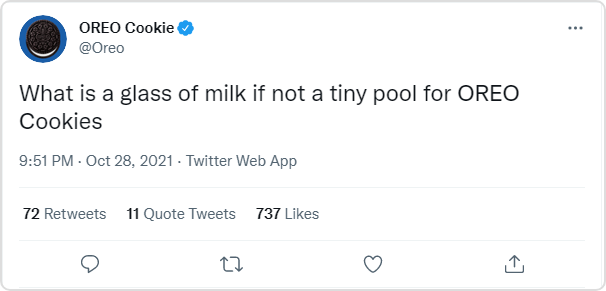
Here’s another joke centered around a holiday:
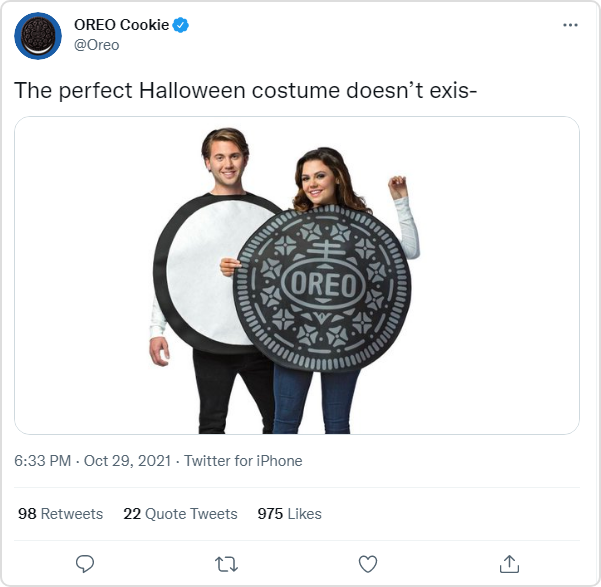
Plus, they take the same approach when jumping on Trends:
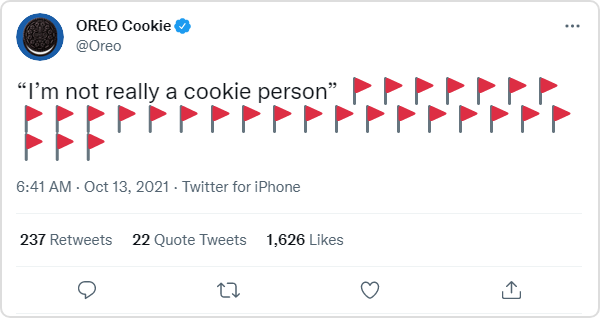
And again:
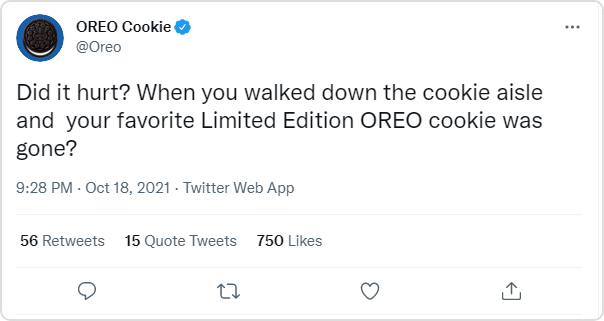
Twitter Case Study: Using Humor in their Twitter Marketing Strategy
Before we wrap this up, let’s look at Twitter’s own popular Twitter business memes and how they use the platform for growing their engagement.
As we share examples and break down how they leverage humor, you’ll see they follow through with all the tips and tactics shared throughout this post. This way, you can get a more practical idea of how to execute humor for your Twitter marketing.
They don’t miss out on trends and take a human approach in their tweets
To begin with, Twitter doesn’t miss trends. For instance, they tweeted about the red flag meme, shedding light on their app:
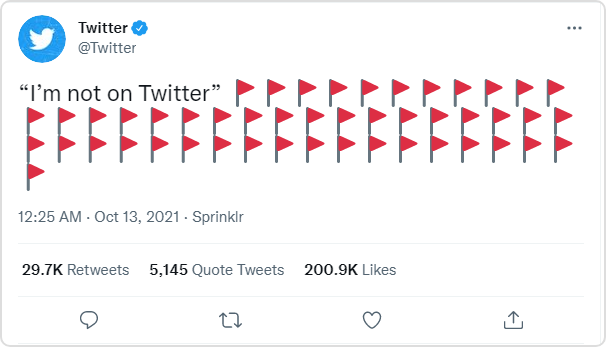
Throughout their tweets, you’ll also see that they talk like a human. This helps them connect with their audience. In fact, even as they make announcements, they take a human approach.
When they announced taking down Fleets (their equivalent of Instagram or Facebook Stories), for example, they tweeted in a fun, light-hearted way:
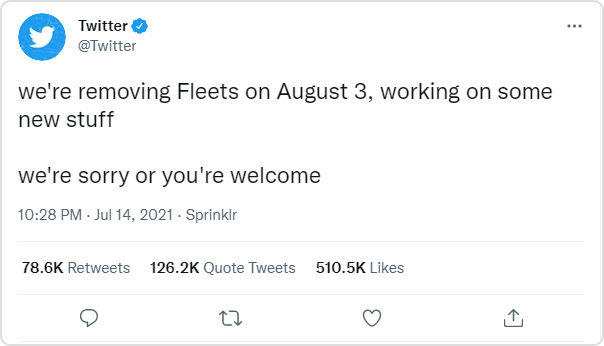
This tweet in itself got a lot of appreciation over at Twitterverse. Why? Because of the way the Twitter team acknowledged their mistakes – a very human thing to do.
They Listen To Their Audience
This is crucial to improve your business according to your audience’s preferences. Equally important is the fact that it shows their audience they value their opinions.
Here’s an example:
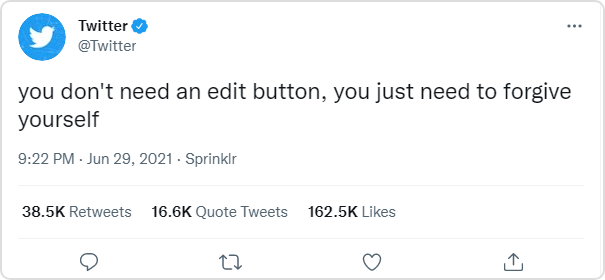
Twitter Pokes Fun At Competitors
A good example of this is when the Facebook family including Instagram and WhatsApp went down back then, Twitter made the most of the situation with a fun tweet without directly offending its competitors.
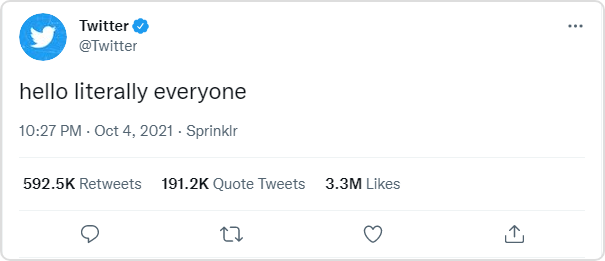
In the comments of this tweet, you’ll also find that Twitter values engaging with their audience too so they don’t come across as broadcasters only.
Audience Engagement Plan
Two prominent things they do: replying to comments and asking questions.
They also engage their followers by asking questions. This tweet is a great example of a brand opening up funny tweet responses:
your Twitter personality in one pic
— Twitter (@Twitter) May 10, 2021
They Mix Up Their Media Format
Finally, funny tweet or not, Twitter uses different media formats to engage its audience. So not all their tweets are text-based.
Some feature funny GIFs and images too. Mainly these tend to include customized GIFs/screen recordings and screenshots to explain about their product.
Here’s how they do so:
tested the Tips feature, turns out people love money
rolling out on iOS with Android coming soon pic.twitter.com/pkmLHzg6fu
— Twitter (@Twitter) September 23, 2021
Humour Your Brand’s Way Through Twitter!
Humor can help you level up your Twitter marketing by getting your audience’s attention and evoking laughs, giggles, and smiles.
Essentially, humor works so well because, when executed well, people can relate to it. Like other brands on Twitter, make fun of situations – not people, talk like a human, and always keep digging into your audience’s interests so you can crack the most relevant jokes to them.
Don’t forget to leverage trends and funny Twitter memes to be funny on the blue-bird network.
FAQS
1. How to increase engagement on Twitter in 2022?
Engaging media content, such as GIFs, videos, and memes, will immediately improve your organic Twitter engagement. Keeping an eye on what’s trending on Twitter or monitoring what’s popular across top accounts on Twitter is an easy way to generate ideas and create great video content.
2. What are the best times to post on Twitter?
You should tweet between noon and 3 p.m. or after 5 p.m. This time corresponds with the lunchtime slump, the afternoon slump, and the time people are on their way home—all of which are reasonable times to check your Twitter feed.
3. What does Twitter engagement mean?
Twitter Engagement is defined as the number of times a user interacts with a Tweet. Clicks anywhere on the Tweet, including Retweets, replies, follows, likes, links, cards, hashtags, embedded media, username, profile photo, or Tweet expansion comes under the roof of twitter engagement.
4. What content performs best on Twitter?
A Twitter user tweets an image 361% more often than a video. Retweets of images are 128% higher than retweets of videos, but favorites of videos are 49% higher than retweets of images.
Recommended for you

Social Media Management Costs in 2026: A Pricing Guide for Businesses

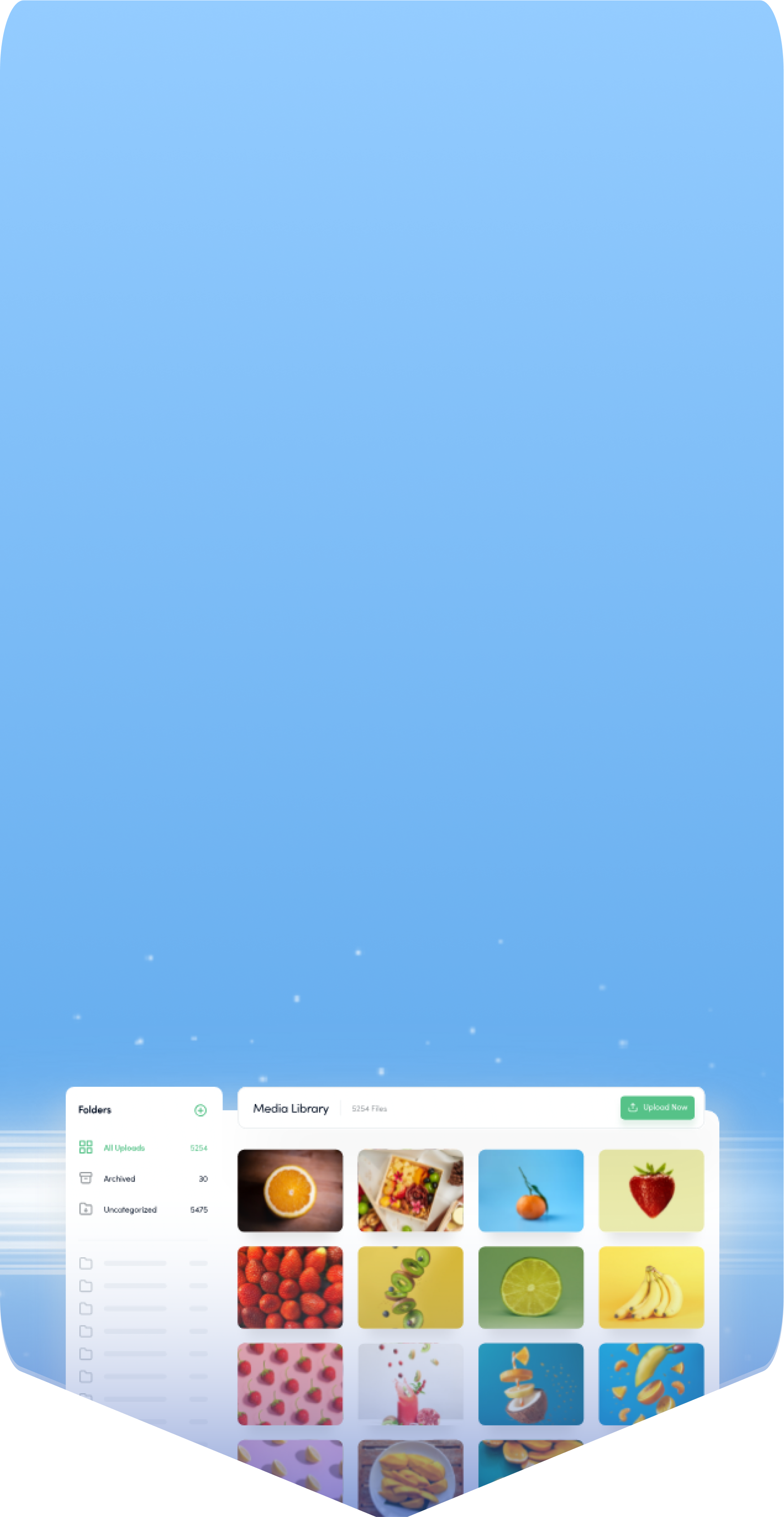
Powerful social media management software
14-day free trial - No credit card required.
